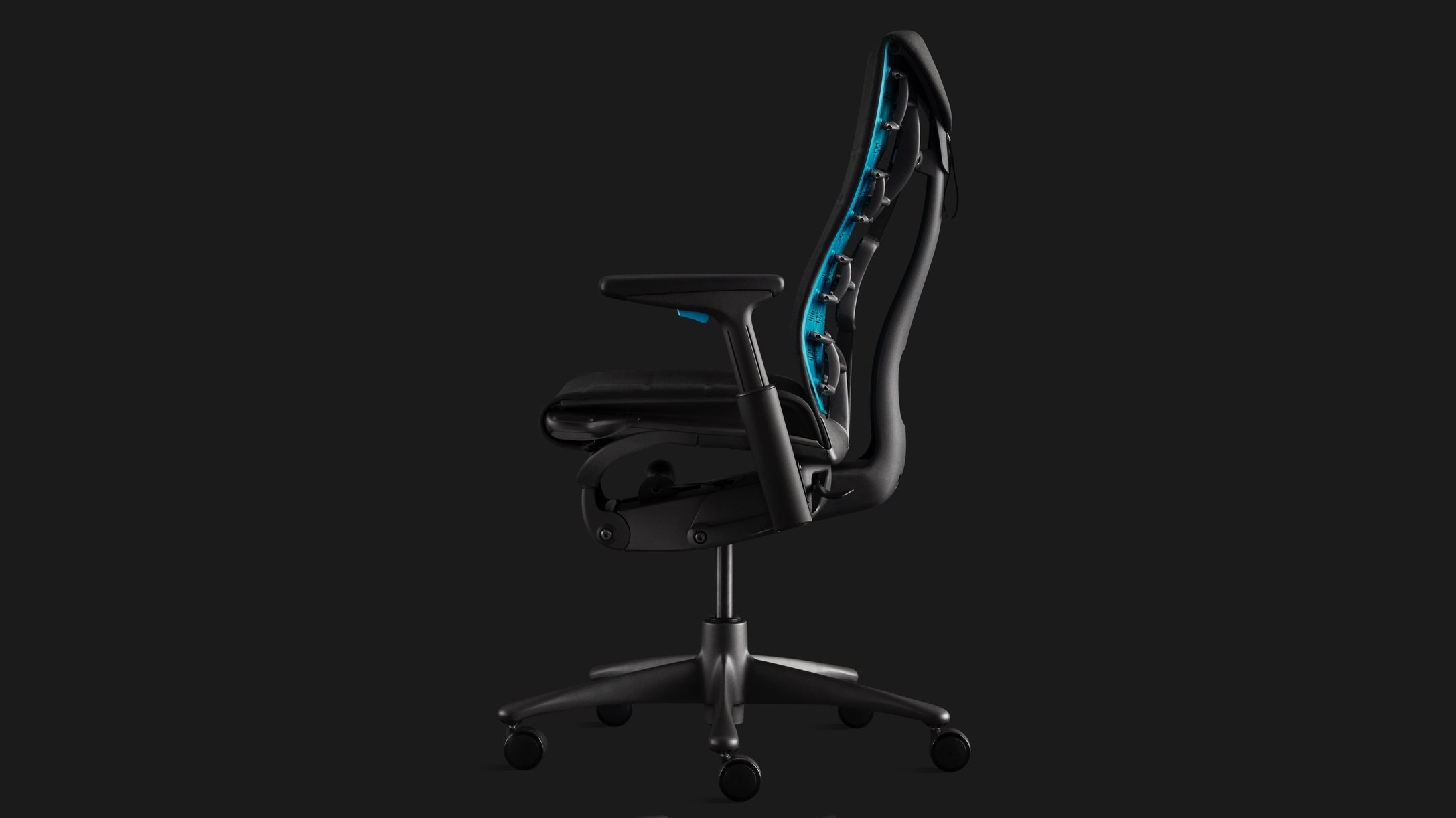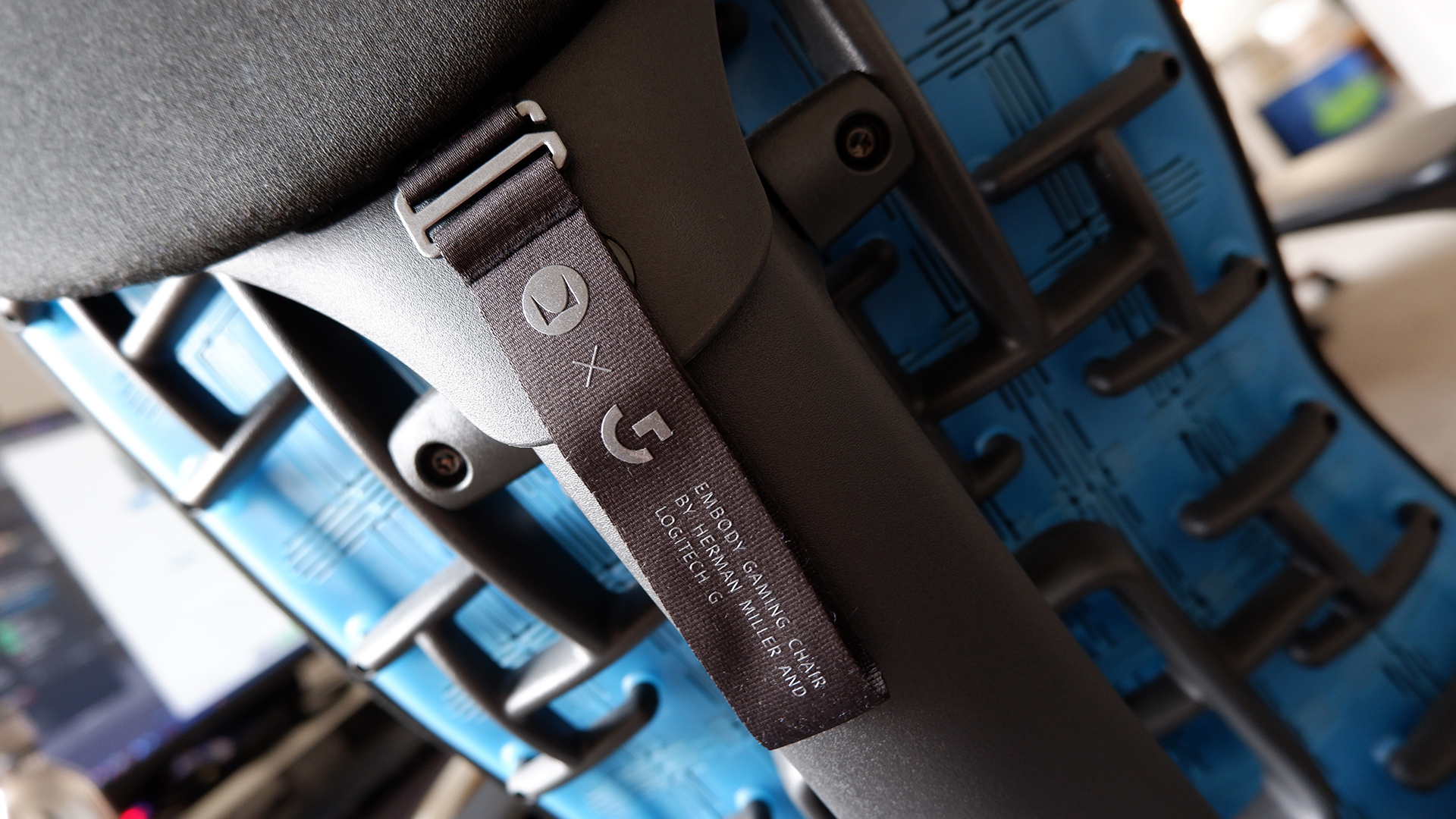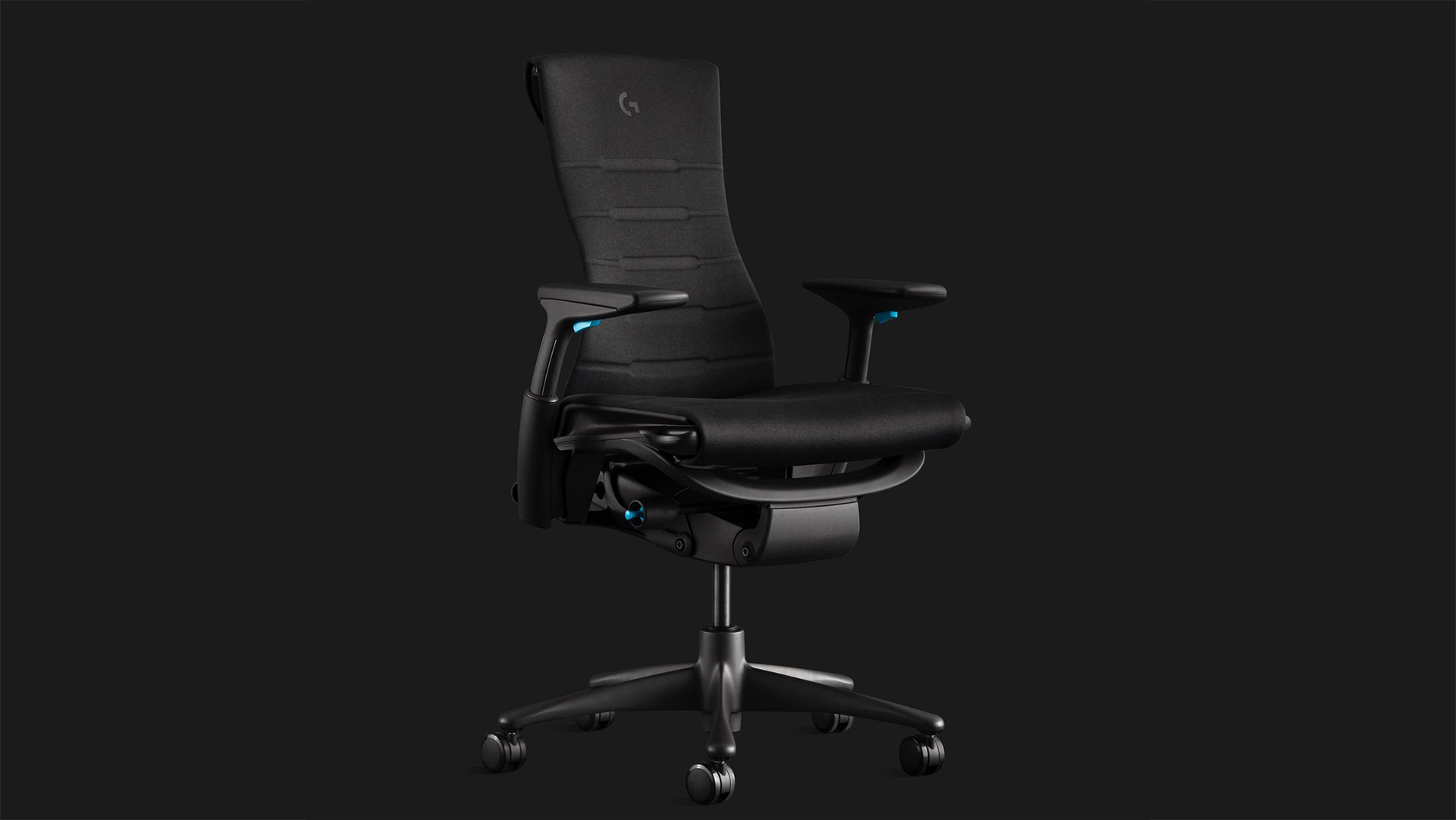Our Verdict
The Herman Miller Embody oozes premium—you'd expect nothing less at this price. With superb comfort and a warranty spanning over a decade, it's absolutely the chair of choice if you're willing to invest in ergonomics.
For
- Extremely comfortable for daily, prolonged use
- Built to last
- 12-year warranty if something goes wrong
Against
- Expensive
- Limited armrest movement
PC Gamer's got your back
I'll be honest, the first thing to enter my mind when I heard about the Herman Miller x Logitech G Embody was the price. It's a $1,595 (£1,195) gaming chair and that's understandably a tall request to make for most of us. If you balk at the concept of dropping that much of your hard-earned cash—that's gaming PC money, after all—there are plenty of cheaper alternatives in our best gaming chair guide to consider.
Herman Miller, however, is a brand built on the concept that ergonomics are something that should be invested in. And that seems to mean more than a lumbar pillow and a faux-racing chair aesthetic. The Embody is far more modest. It's instead banking on people gladly spending a chunk of change on comfort and stellar ergonomics. So I've headed into this review with that in the forefront of my mind, and tried to consider why you might wish to spend the cost of a second-hand car on a gaming chair, and whether you will come away feeling like you got your money's worth.
I'll admit that wasn't an easy task for someone who instinctively sees a £1,200 chair and thinks "too much". But times have changed, and after the year we've had, the price doesn't seem so crazy—even before I lay my posterior on it. Working from home, and spending all but a fraction of the day sitting down, a comfortable chair that I trust with custody of my spine has become a necessity.
A chair that champions complete support above all else is more interesting to me now than ever before. And that's regardless of the Logitech collaboration, which mostly seems to be a branding exercise to entice gamers to consider a high end throne, rather than one of the bucket seats so beloved of streamers.
Yet I wasn't sure what to expect of the Embody before it arrived. I certainly hadn't envisioned such a massive box turning up on my doorstep. First impressions, then, entirely focused on how I was going to get said box up two flights of narrow steps leading up to my apartment.
Weight limit: 136 kg
Total Height: 1067–1143 mm
Material: Sync Fabric (polyester), foam layer
Warranty: 12-year, 24-hour
MSRP: $1,445 (£1,195)
That massive box hides what is perhaps one of the Herman Miller's best features. After deciding that I had to cut the chair out of the box with a knife in my hallway, I discovered a chair fully assembled and wrapped in little more than some clever cardboard. There's absolutely no fussing with screws or throwaway tools required, which is something of a pet peeve of mine. ('m amassing third-rate Allen keys from cheap flatpack furniture and I can't help but feel there's got to be a better way.)
Perhaps Herman Miller's onto something here, then—premium packaging without the assembly work. We're certainly off to a good start when it comes to feeling like a lux chair, but short-lived success on receipt of delivery is hardly what you've paid good money for.
The Embody chair itself is actually rather compact. There's no towering headrest to speak of—Herman Miller says an ergonomic chair done right needn't have one—and the slim body-fitting backrest and small frame make for an overall design that's dwarfed by the Cooler Master Ergo L I had been using previously.

In spite of its compact design, the Embody does feature a wide seat without any outer extrusions to keep you bolted in. An important abstention for all-day comfort, I assure you. The seat is made up of a couple sprung meshes supporting a matte and foam cushion design covered in, what Herman Miller calls, Sync Fabric. Essentially it's a 100% polyester fabric that Herman Miller rates for its durability, colour retention, and strength. You really want to be sure it's ready to stand the test of time, and while I can't say how it will hold up over a decade of wear, it's not yet shown a single sign of damage yet.
For the most part the Herman Miller x Logitech G Embody actually isn't a complete departure from the Embody of old. A tried, tested, and widely recognised design, the gaming Embody comes in a new black and blue colourway, with plain black also available if you're going for a more sober/edgelord look. There's also a small Logitech G brand toggle on the rear, that doesn't serve any purpose that I know of, and a Logitech G logo across the upper band of the backrest.
Again, I'm not sure the Logitech collab is bringing a lot to the party, but the branding is notably light touch next to the racing style gaming chairs that we're used to as PC gamers, and it feels classy as a result.
A foam layer within the seat is actually one of the few functional differences between the Embody and Logitech G Embody. It's said to add a little more support while sitting bolt upright, and intended to keep your rear cool. Speaking from experience it's deceivingly comfortable over prolonged use, although it's tough to say whether it adds much beyond the original model.
It's the most immediately noticeable trait of this chair: You can sit in it all day and not feel a moment of discomfort beneath your tush. You may shift around your top half into all sorts of absolutely not ergonomic positions during the day but your bottom half tends to stay stuck in place at a desk, so it's important to get that just right. Thankfully, the Embody does.

When you are sitting correctly in the chair, which Herman Miller will tell you how to do in its promotional videos (tip: feet forward and flat on the floor), the back rest is wonderfully supportive. It offers a little give and take thanks to a construction of sprawling supports that span the rear of the chair, and connected to the main column of the backrest at just a few pivotal points.
There is a lot you can do to improve your PC desk and setup to be healthier and more comfortable without spending a penny. Take a look at our guide to how to sit at a desk with good posture for the precautions you can put in place today.
While some chair designers may use ergonomics as an excuse for their weirdest and wildest designs, the Embody is relatively reserved in design and operation. The lack of headrest case and point, but the lack of extensive movement in the armrests is further testament to Herman Miller's 'we know best' approach.
Luckily you needn't be overtly conscious of your posture at all times to get the most out the Embody. So long as you're not straddling it in a vein attempt to get 'down with the kids' you'll probably find it as passively comfortable as I have.
Functionally, then, the Herman Miller Embody is excellent. You'd expect nothing less for a whopping $1,595 (£1,195). Is that alone enough to warrant the price tag? It's still not an easy decision. Where the Herman Miller gains favour is when you factor in the too easily dismissed 12-year warranty.
A 12-year warranty for a £1,195 chair makes for easy maths: a touch under £100 a year. The warranty is extensive, too. It covers 24-hour use (three shifts in bleak corpo speak, eight hours a piece) and covers just about everything: pneumatics, casters, armrests, you name it. Some surface-grade damage to the fabric might not net you a new chair, but you're effectively covered for everything else for over a decade.

With that, the price tag becomes more easily understood. I'm not saying it's going to swing anyone initially shaken to their core by that price tag's four digits, but those on the fence may feel significantly more confident in the longevity of their new gaming chair purchase with the warranty factored in. That warranty is something rarely replicated by other gaming chair brands, either. From searching the top chairs from our roundup only a few came close to a 12-year, all-in standard warranty. That's the Mavix M9 and Steelcase Gesture. Both of which follow the task chair approach to gaming thrones.
Both are a little cheaper than the Herman Miller, however, and both have their proponents in PC Gamer's top brass. Certainly worth checking out these two, often found for less than the Embody, before hitting the checkout.
Without resting my rear in either, however, I must judge the Herman Miller by its merit, and the 12-year warranty that tipped this chair for me. By far the most expensive I've reviewed, it's also the one I feel oozes premium comfort and support. With a 12-year warranty making sure that stellar experience never dampens, not even a little, it's easy to see why Herman Miller has the premium office chair market largely wrapped up.
Does said Herman Miller X Logitech G Embody necessitate the gaming chair title over its not-so-humble office origins? Perhaps not, it still feels like that same Embody as before with a few extras that aren't easily distinguishable in action. Yet, if anything, this chair is proof that little need be done to replicate Herman Miller's success for those of us that prefer gaming on a PC as opposed to working at one.
The Herman Miller Embody oozes premium—you'd expect nothing less at this price. With superb comfort and a warranty spanning over a decade, it's absolutely the chair of choice if you're willing to invest in ergonomics.

Jacob earned his first byline writing for his own tech blog. From there, he graduated to professionally breaking things as hardware writer at PCGamesN, and would go on to run the team as hardware editor. He joined PC Gamer's top staff as senior hardware editor before becoming managing editor of the hardware team, and you'll now find him reporting on the latest developments in the technology and gaming industries and testing the newest PC components.


